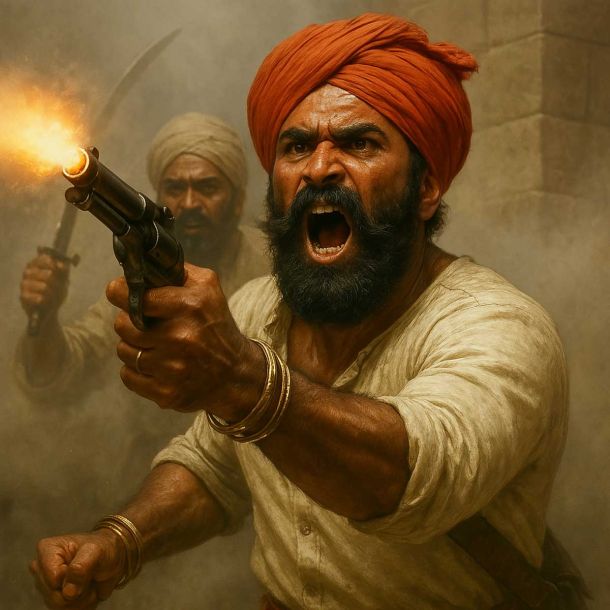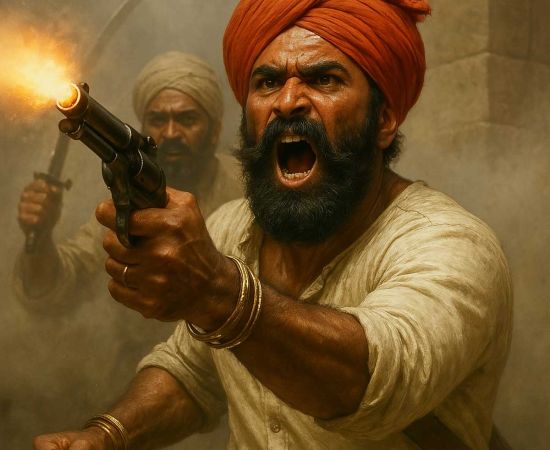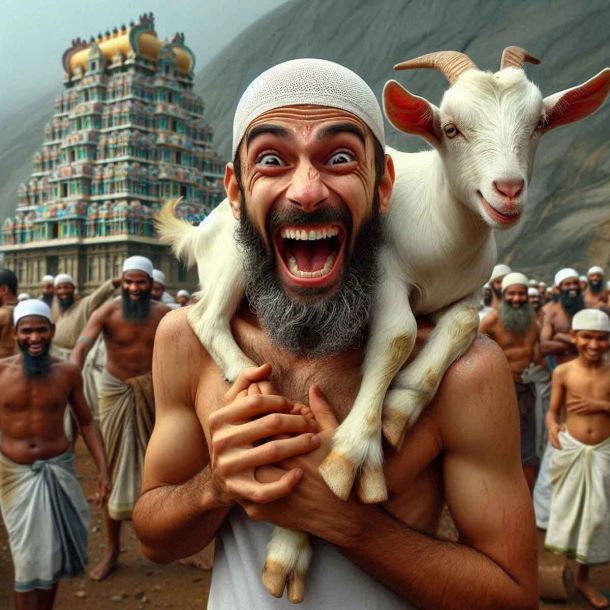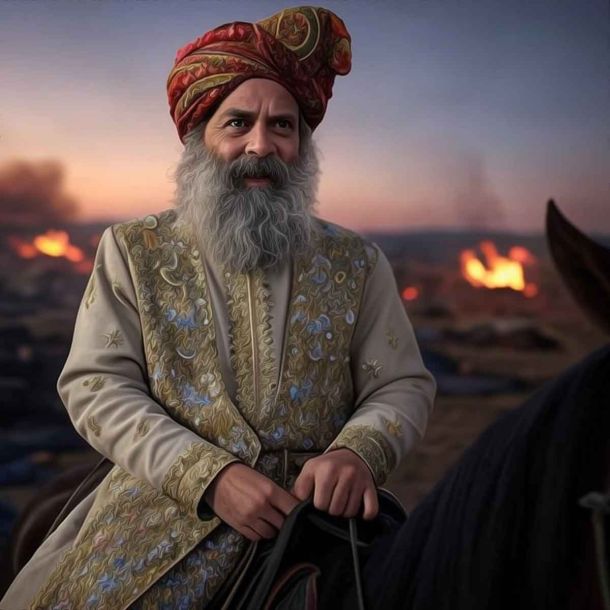MORE COVERAGE
Twitter Coverage
Satyaagrah
Written on
Satyaagrah
Written on
Satyaagrah
Written on
Satyaagrah
Written on
Satyaagrah
Written on
JOIN SATYAAGRAH SOCIAL MEDIA
"The Kerala Story 2.0": In a trend that's both provocative and poignant, reels showing Muslim girls removing bindis from Hindu classmates and making them wear hijabs going viral, highlighting urgent discussions on identity, coercion, and cultural norms
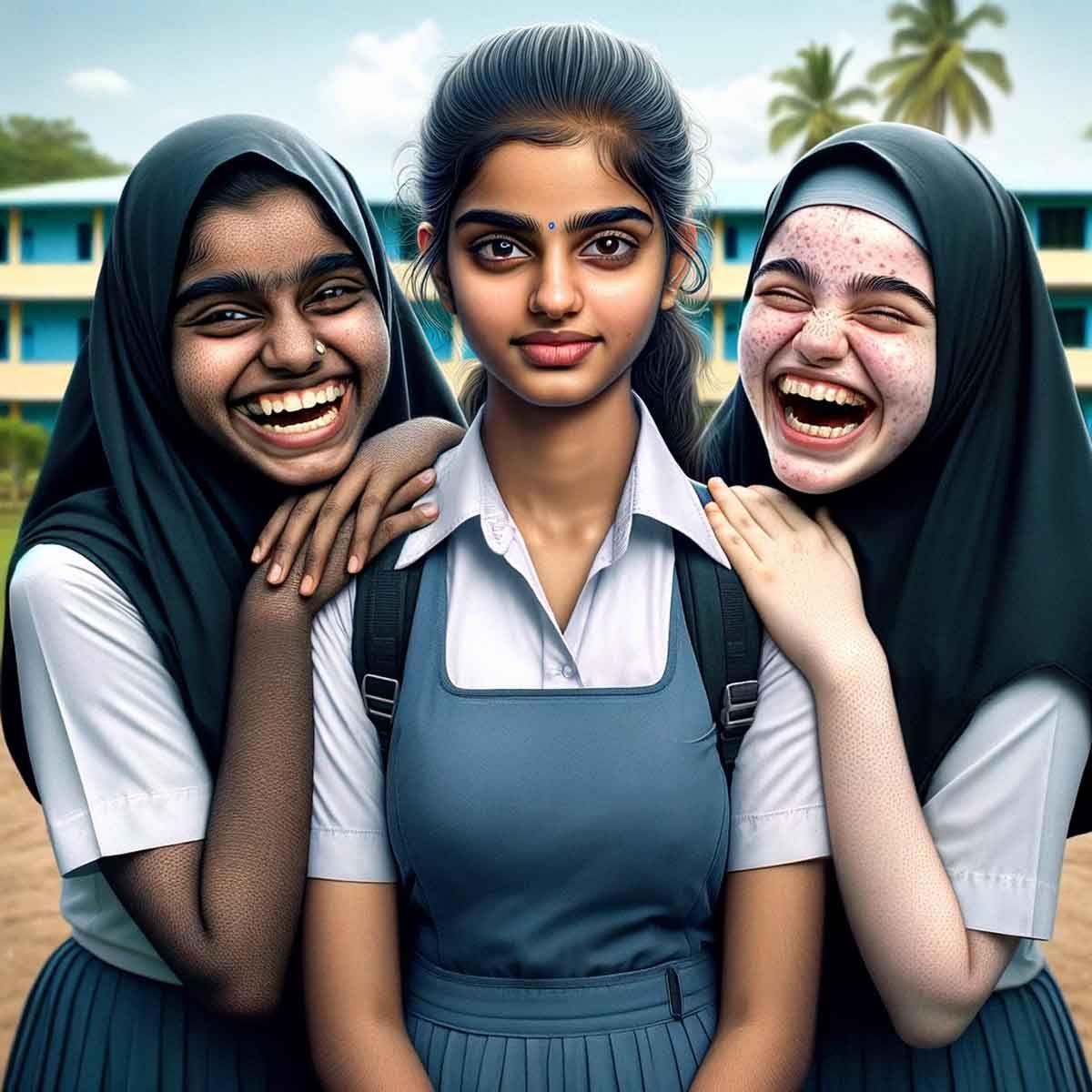
A dangerous trend is emerging where Muslim schoolgirls are removing bindis & making their classmates wear hijab. The Kerala Story 2.0 incoming.
|
The narrative around the cultural practices in schools hints at a concerning pattern, as highlighted by the statement that there's an emerging trend where Muslim schoolgirls are influencing their classmates to adopt the hijab while discarding traditional Hindu symbols like the bindi. This situation is presented as a precursor to a potential "The Kerala Story 2.0," implying that the issues depicted in the film are not isolated incidents but part of a broader, ongoing phenomenon. The reference to such changes in dress and cultural symbols in schools is indicative of deeper concerns about identity, religious freedom, and the influence of peer groups on personal beliefs and practices.
The phrase "Ajnaye Chakra! Erasing a Tilak is akin to trying to remove the core consciousness concept (Third eye) of sanatan dharm! We don’t have a book, we have a library! But what if consciousness is destroyed!" captures a profound sense of cultural and spiritual loss. It suggests that removing a tilak (a mark worn on the forehead, often representing the third eye in Hindu philosophy) is not just a physical act but an attempt to erase an essential aspect of Hindu consciousness and identity. The statement metaphorically underscores the richness and depth of Sanatan Dharma, likened to a vast library, raising concerns about the implications of diminishing such a diverse and profound heritage through the suppression of its symbols.
|
The progression outlined—from demands for separate minority schools, integration into secular schools, requests for wearing hijabs in schools, pressuring Hindu girls to wear hijabs and remove bindis, converting Hindu girls, to eventually banning "The Kerala Story" as fake under the hashtag #KeralaModel—sketches a slippery slope of increasing demands and changes in cultural practices within educational settings. This portrayal suggests a strategic, step-by-step approach to altering the cultural and religious landscape of schools and, by extension, society. The concern here is not just about individual choices in religious or cultural expression but about the perceived imposition of one group's practices on another, leading to fundamental changes in the societal fabric and the potential erasure of cultural diversity.
|
This narrative points to fears of cultural homogenization and the loss of pluralism, raising alarms over the respect for and preservation of diverse cultural identities in a rapidly changing social environment. It underscores the need for dialogue, mutual respect, and understanding to navigate the complexities of cultural and religious coexistence in a pluralistic society like Kerala's.
In the past year, a significant movie, "The Kerala Story," was released, leading to widespread discussions. This film highlights the alarming issue of Love Jihad by narrating the stories of several girls from Kerala. These individuals were forced into converting to Islam and eventually ended up in areas controlled by ISIS (Islamic State of Iraq and Syria) or IS (Islamic State), revealing a concerning reality.
Predictably, individuals with leftist ideologies quickly criticized the movie, dismissing it as mere propaganda. They argued it was designed to provoke negative sentiments towards Muslims and to uphold the principles of Islamic ideology.
|
Many liberals, including prominent figures like the self-proclaimed fact-checker "Mohammad Zubair" and Dhruv Rathee, invested significant efforts to undermine the credibility of "The Kerala Story." They criticized the film as an extreme form of propaganda, accusing it of spreading falsehoods about the conditions in Kerala. They described the movie's portrayal as overly dramatic and misleading, suggesting it relied on sweeping statements, exaggerated humor, and a complete absence of subtlety in its narrative.
Furthermore, some websites also criticized the movie, arguing that its approach to storytelling was heavily biased. They believed the film used broad generalizations and comical exaggerations, pointing out its total disregard for nuanced discussion. This criticism aimed to highlight perceived flaws in the movie's depiction of events, suggesting it served more as a tool for propaganda than an accurate representation of reality.
|
We have also shared several video on X that brings to light another concerning aspect depicted in the film: the gradual indoctrination of young Hindu girls by Islamist ideologies. This video aimed to illustrate a troubling trend, showcasing how these girls were being subtly influenced, further emphasizing the film's message about the dangers facing certain communities. This aspect of the narrative aimed to shed light on the insidious ways in which young individuals could be swayed, drawing attention to the broader implications of such influences on society.
In the shared video, which does not have a date, a scene unfolds where Muslim girls are seen gently removing a bindi from a Hindu girl's forehead. The bindi is widely recognized as a significant Hindu cultural symbol. Following this, they proceed to dress the Hindu girl in a hijab, introducing her to a different cultural attire. This specific act depicted in the video has sparked renewed discussions around the controversial topic of "Love Jihad." This term refers to the alleged phenomenon where Hindu girls in Kerala are said to be targeted for brainwashing and forced conversion to Islam, raising concerns about cultural and religious assimilation under duress.
|
Adding to the complexity of this issue, reports have surfaced claiming a staggering number of over 32,000 non-Muslim women in Kerala have been coerced into converting to Islam, subsequently becoming involved with ISIS. These reports suggest that such conversion activities continue to thrive in the state, purportedly with the tacit approval or support of local government entities. This alarming narrative gained further credibility with a 2016 report by the Times of India, which highlighted the conversion of more than 6,000 individuals to Islam within Kerala alone. Further detailed by an intelligence report submitted to the state's police chief seven months prior to the Times of India article, it was revealed that two recognized religious conversion centers in Kozhikode and Malappuram were responsible for converting as many as 5,793 people to Islam from 2011 to 2015. These figures and incidents have fueled a contentious debate on religious conversion practices, the role of government, and the impact on societal harmony and individual rights within the region.
|
The concern over communal tensions in the state was significantly highlighted by VS Achuthanandan, a former Chief Minister, who voiced serious apprehensions regarding the direction in which the state's demographic and communal harmony was heading. In a revealing interview conducted in 2010, Achuthanandan made a profound statement, asserting, “They (the ruling party) want to turn Kerala into a Muslim-majority state in 20 years. They are using money and other inducements to convert people to Islam. They even marry women from outside their community in order to increase the Muslim population.” This comment sheds light on the fears of deliberate demographic changes being orchestrated through financial incentives and inter-community marriages, aimed at boosting the Muslim population within Kerala.
|
Further amplifying his concerns, during a press conference held in Delhi, Achuthanandan elaborated on the mechanisms allegedly employed by Muslim fundamentalists in the state to expand their influence. He accused these groups of fostering conversions to Islam by investing financial resources to appeal to the youth and arming them, a strategy purported to also include persuading young men to marry Hindu girls. According to him, these actions were part of a broader strategy aimed at increasing the Muslim community's dominance in Kerala. Achuthanandan's allegations spotlight the complex interplay of religion, politics, and societal dynamics in the state, contributing to an ongoing debate about the future of its communal fabric and demographic structure.
|
According to a report by the US State Department titled Country Reports on Terrorism 2020, as of November 2020, there were "66 known Indian-origin fighters affiliated" with the Islamic State (IS). This statistic underscores the global reach of IS and highlights the concerning involvement of individuals of Indian origin in such extremist activities. The report serves as a critical reminder of the ongoing challenges faced in combating terrorism and the influence of IS beyond the Middle East, extending into countries like India.
|
In a further development, the National Investigation Agency (NIA) of India, in September 2021, disclosed that it had made significant headway in its efforts against terrorism inspired by IS's ideology. The NIA reported the arrest of 168 individuals in connection to 37 cases related to "terror attacks, conspiracy and funding." This proactive approach by the NIA illustrates India's commitment to dismantling networks and preventing acts of terrorism that are motivated by the radical ideology of the IS.
The promotion of certain narratives and portrayals, as suggested to be seen in various social media reels that align with the themes depicted in "The Kerala Story" movie, raises alarms over potential indoctrination and radicalization efforts within educational institutions. The call for immediate investigation into schools and colleges suggests a deep concern over the use of education spaces for promoting ideologies that could lead to radicalization. The assertion that there is a "big conspiracy to make the entire state an Islamic state" reflects apprehensions about concerted efforts to alter the socio-religious fabric of Kerala through influence and indoctrination. This perspective underscores the need for a careful and thorough examination of educational content, extracurricular activities, and social media influences to safeguard against any form of radicalization or extremism that could threaten communal harmony and national security.
 |
 Support Us
Support Us
Satyagraha was born from the heart of our land, with an undying aim to unveil the true essence of Bharat. It seeks to illuminate the hidden tales of our valiant freedom fighters and the rich chronicles that haven't yet sung their complete melody in the mainstream.
While platforms like NDTV and 'The Wire' effortlessly garner funds under the banner of safeguarding democracy, we at Satyagraha walk a different path. Our strength and resonance come from you. In this journey to weave a stronger Bharat, every little contribution amplifies our voice. Let's come together, contribute as you can, and champion the true spirit of our nation.
 |  |  |
| ICICI Bank of Satyaagrah | Razorpay Bank of Satyaagrah | PayPal Bank of Satyaagrah - For International Payments |
If all above doesn't work, then try the LINK below:
Please share the article on other platforms
DISCLAIMER: The author is solely responsible for the views expressed in this article. The author carries the responsibility for citing and/or licensing of images utilized within the text. The website also frequently uses non-commercial images for representational purposes only in line with the article. We are not responsible for the authenticity of such images. If some images have a copyright issue, we request the person/entity to contact us at This email address is being protected from spambots. You need JavaScript enabled to view it. and we will take the necessary actions to resolve the issue.
Related Articles
- Jauhar of Rani Padmini and the enduring Muslims legacy of enacting necrophilia act of gang raping dead bodies
- In yet another horrific incident of grooming jihad Mohammad Yasin, a supplier of ayurvedic medicine killed his second wife ‘Zara’ earlier a Hindu girl 'Shiva Vishwakarma': Left their three-year-old girl child outside the house
- Supreme Court dismisses plea seeking protection of Hindus from the Muslim community in Mewat
- "नमाज़-ए-जंग": Denied entry at local mosques, Muslim girls at Nirmala College audaciously demanded prayer space; when refused—citing a 72-year precedent—the students escalated their protest, culminating in gheraoing of the principal and creating a ruckus
- "इस्लामी तालीम": Vikram Univ initiates a thorough investigation into Prof Anis Shaikh for promoting Islam, systematically giving lower grades to Hindu students and forming an exclusive WhatsApp group for female students, stirring significant campus unrest
- Pakistani Media reporting abduction, forceful conversion as a consent marriage with the Muslim abductor in SIndh
- Periyar EV Ramasamy and his relationship with Islam
- "नीम-हकीम ख़तरा-ए-जान": Haridwar police in Uttarakhand are hunting for Hakeem Mufti Adil for tricking illiterate couple Charan Singh and Sangeeta into converting to Islam with promises of money and land; was distributing medicines in the area for years
- "कुल या अय्युहल काफिरून": A ‘jhad-fook’ Maulana Mushtaq Ali and his three sons Akram, Junaid, and Faizan threatened, raped Hindu woman and daughter in Prayagraj, and forcibly convert their family to Islam; sons arrested and Maulana is already deceased
- Mass religious conversion racket reaches Gujarat: How Santosh went missing and returned as Abdullah
- Pinarayi Vijayan's Communist govt promotes 'Islam in Kerala' through a detailed microsit, while tourism seems the front, questions loom: Is it genuine promotion or subtle appeasement? Accusations of historical distortions by the Minister add to the debate
- Violence Against Minority Hindus in Bangladesh: The Mistier World Of Silence
- Dhimmitude is nothing but a Stockholm Syndrome
- Land Jihad being carried out by Waqf Board much more dangerous than Love Jihad; Hindus need to fight this
- UP mass conversion: How Darsh Saxena, Rajeshwari and Priyanka became Mohd Rehaan Ansari, Razia and Fatima, more details emerge


